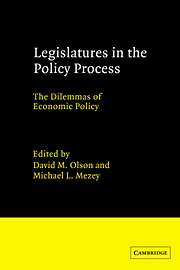Preface
Published online by Cambridge University Press: 03 March 2010
Summary
In the 1960s and 1970s, democracies failed around the world and legislatures either were abolished or subordinated, leading to the thesis of the “decline of parliaments.” By 1990, however, as democracy returned to Latin America and the Mediterranean region, and as Communist systems of Eastern Europe were transformed into coalitional and elective regimes, we might be tempted to assert the rhetorically opposite thesis, the resurgence of legislatures.
We do not succumb to that temptation in this book. We do, rather, closely examine the conditions under which legislatures are autonomously active in setting public policy.
We include countries around the world in a variety of political systems. Our chapters on Brazil and Poland provide a snapshot of institutions in evolution, showing how they became more active and assertive than under previously rigid military and Communist regimes, respectively.
But our chapters on more stable democratic systems raise cautionary flags in our thinking about legislatures – be they in advanced industrial states as in Europe and the United States, or newly industrializing former colonies such as India. In these democracies, legislatures face formidable obstacles in even defining, much less asserting, policy preferences independently of and in opposition to their chief executives.
We do not look at legislatures as inert impersonal structures, but as organizations and politicians in action as they attempt to shape their respective countries’ policy on economic issues. We examine economic issues both as important in themselves and as providing a clear view of legislatures and legislators in motion.
- Type
- Chapter
- Information
- Legislatures in the Policy ProcessThe Dilemmas of Economic Policy, pp. xi - xiiPublisher: Cambridge University PressPrint publication year: 1991
- 1
- Cited by

